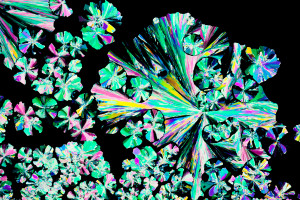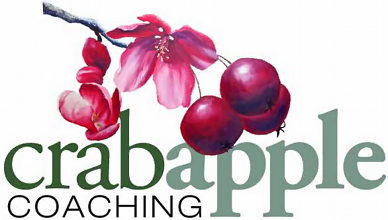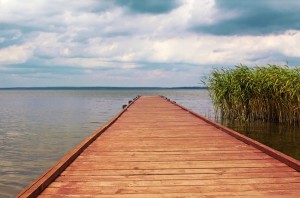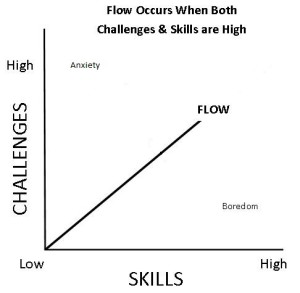Retirement Stats, Studies, and Stuff
By Mariella Vigneux, MBA, ACC
Certified Professional Coach
As I’ve gotten older, the list of things I know to be true has gotten shorter. One thing that remains on my list, however, is the concept of flow. I believe that flow – the sense of being in the zone – is fundamental not only to personal fulfillment but to the evolution of humankind.
Dr. Mihaly Csikszentmihalyi, Professor of Psychology at the University of Chicago and a respected voice in the social sciences, laid the groundwork for the concept of flow. In an interview for EnlightenNext Magazine, Dr. Csikszentmihalyi describes how he came up with the concept:
“In the early seventies, I spoke with chess players, rock climbers, musicians, and inner-city basketball players, asking them to describe their experience when what they were doing was really going well. I really expected quite different stories to emerge. But the interviews seemed in many important ways to focus on the same quality of the experience. For instance, the fact that you were completely immersed in what you were doing, that the concentration was very high, that you knew what you had to do moment by moment, that you had very quick and precise feedback as to how well you were doing, and that you felt that your abilities were stretched but not overwhelmed by the opportunities for action. In other words, the challenges were in balance with the skills. And when those conditions were present, you began to forget all the things that bothered you in everyday life, forget the self as an entity separate from what was going on—you felt you were a part of something greater and you were just moving along with the logic of the activity.”
The effortless joy of flow
Csikszentmihalyi and his colleagues have since interviewed tens of thousands of people around the world, including such varied groups as tapestry weavers in Borneo, Dominican monks, and motorcyclists. No matter how these people found flow, their descriptions correlated:
“Everyone said that it was like being carried by a current, spontaneous, effortless like a flow. You also forget time and are not afraid of being out of control. You think you can control the situation if you need to. But it’s hard because the challenges are hard. It feels effortless and yet it’s extremely dependent on concentration and skill. So it’s a paradoxical kind of condition where you feel that you are on a nice edge, between anxiety on the one hand and boredom on the other. You’re just operating on this fine line where you can barely do what needs to be done.”
The graph below describes when people are most likely to experience flow. During low-challenge activities, people become bored. If an activity is too challenging, they experience worry and anxiety. When both challenges and skills are high, flow occurs.
Source: Mihaly Csikszentmihalyi, 2003
Common sensations during a flow experience
In his book Leadership, Flow, and the Making of Meaning, Csikszentmihalyi describes the common sensations people have when in a flow state:
1. Concentration Deepens
….we no longer have to think about what to do, but act spontaneously, almost automatically, even when some aspect of the task at hand is very difficult or dangerous
2. The Present Is What Matters
Because in flow the task at hand demands complete attention, the worries and problems that are so nagging in everyday life have no chance to register in the mind.
3. One Feels in Control
…. we know that as long as we respect its challenges and develop the appropriate skills to meet them, we stand a good chance of being able to cope with the situation. It has to do with the ability to control one’s own performance rather than the environment itself.
4. The Sense of Time Is Altered
…. time is perceived as flying by…. In some cases the opposite effect takes place, and time seems to expand rather than contract.
5. The Ego is Absent
…. while immersed in the experience one tends to forget not only one’s problems and surroundings, but one’s very self….It’s an exhilarating feeling to be momentarily relieved of self-consciousness, of one’s ambitions and defeats, fears and desires.
Adapted from Leadership, Flow, and the Making of Meaning, Milahly Csikszentmihalyi, 2003, pages 46-55.
Examples of flow
I’ve experienced flow many different ways: during hard running workouts; when I worked as part of a team managing the public health crisis during the Walkerton e-coli outbreak; when searching for the perfect photo in the wilderness near my home; canoeing; navigating through coaching conversations; singing complex requiems with the choir; and quietly being in the moment.
Dr. Csikszentmihalyi gave a particularly good example of flow, experienced by his brother Moricz. In his eighties, Moricz took up the collection and study of crystals.
“I was looking at this thing just yesterday,” he said, smiling. “It was nine in the morning when I put it under the microscope. Outside it was sunny, just like today. I kept turning the rock around, looking at all the fissures, the intrusions, the dozen or more different crystal formations inside and around … then I looked up, and thought that a storm must be coming, because it had gotten so dark … then I realized that it was not overcast, but the sun had been setting – it was past seven in the evening.”
Flow and Personal Fulfillment
I believe that flow is a vital, if overlooked, ingredient of happiness. Flow is that exhilarating sensation of being fully alive. Your entire being is stretched in the full functioning of body and mind. You become totally involved in meeting a challenge, solving a problem or discovering something new. The outcome is that you feel fulfilled, because you’ve lived up to your potential.
Flow and the evolution of humankind
Where does the evolution of humankind come into it? When we involve ourselves in activities that increase our challenges while developing our skills, we grow, whereas if we sit around as idle spectators, sipping pina coladas and watching television, we might experience pleasure, but no growth. Flow fosters growth. And, according to Csikszentmihalyi, as we grow we become more complex. Complexity is what leads to evolution.
Self-Coaching Questions
Can you identify three times in your life when you experienced flow? Consider flow that occurred in physical activities, hobbies, artistic pursuits, social interactions, group endeavours, and work activities.
What sensations did you experience when in flow (e.g., intense concentration, being in the moment, the falling away of worries, a sense of control, time slowing or speeding up, forgetting about yourself and your ego)?
What challenges were you facing and what skills were you developing?
Coming next issue
Part 2: Flow – the overlooked ingredient in the recipe for happiness
In this article we’ve looked at what flow is and why it is important. In Part 2, in the next issue of the newsletter, we’ll look at loss of flow in retirement and what we can do to create more opportunities for flow.



My grandson Ethan frets and pre-worries before the time for action commences, but once in motion he is poetry. He has almost mastered snowboarding in only three or four outings. He is only seven and still has no front teeth. His granddad was amazed to see him flying down the mountain at Big White on the weekend. He was proud of all Ethan’s ballsy maneouvers!
I was flowing when I did the Olympic distance triathlon. although extremely nervous, it was easy once I got started and since I had done tons of training the concentration and the movements were natural and fun.
Also when I did my first painting. It was about 5 feet by 6 feet and I got zoned in and wanted to paint all day….which I did. It took me away somewhere.
Every time I make space to paint I forget the world and stuff just happens and something shows up on the canvas. I never quite know what it will look like, so I call it my style.
Childbirth has a flow. lol
You asked for three experiences after all.
Christine, your description of flow moments are exactly what the article was about. That sense of loss of time – “It took me away somewhere,” and “I forget the world.” That magic of competence – “…stuff just happens.” You’ve had no shortage of peak moments, by the sound of it.
And young Ethan… on a steep learning curve, doing something he loves, challenging himself, getting better and better, and flying down the mountain. Apparently, kids are very good at getting into flow. I guess they’re more in the moment than most adults. But I suspect he’s got a bit of his grandmother’s gutsiness in him too. Olympic distance triathlon!
I believe this flow happens in the garden as well. I can leave the house expecting to spend an hour or 2 and next thing I know it is late afternoon and I have no idea how much time has passed. It takes you to another space where nothing else matters except the task at hand. It was a great escape when working full time, and now with those stressors gone it will become pure pleasure enjoyed more frequently.
That sounds exactly like a flow experience, Barb. I imagine you have gorgeous gardens (under all that snow).
In her article I think Rose was describing flow when she wrote: “When I am absorbed and totally given to whatever I am doing, it is glorious and there is no deeper satisfaction. When I walk a little away from it, I can see how it becomes me, how it is both the character of my life and the character of me.” I like the synergy of two descriptions of flow in the same newsletter!
You’re so right, Amy. Rose has beautifully captured the experience of flow. I hadn’t realized. Thanks for your insight.